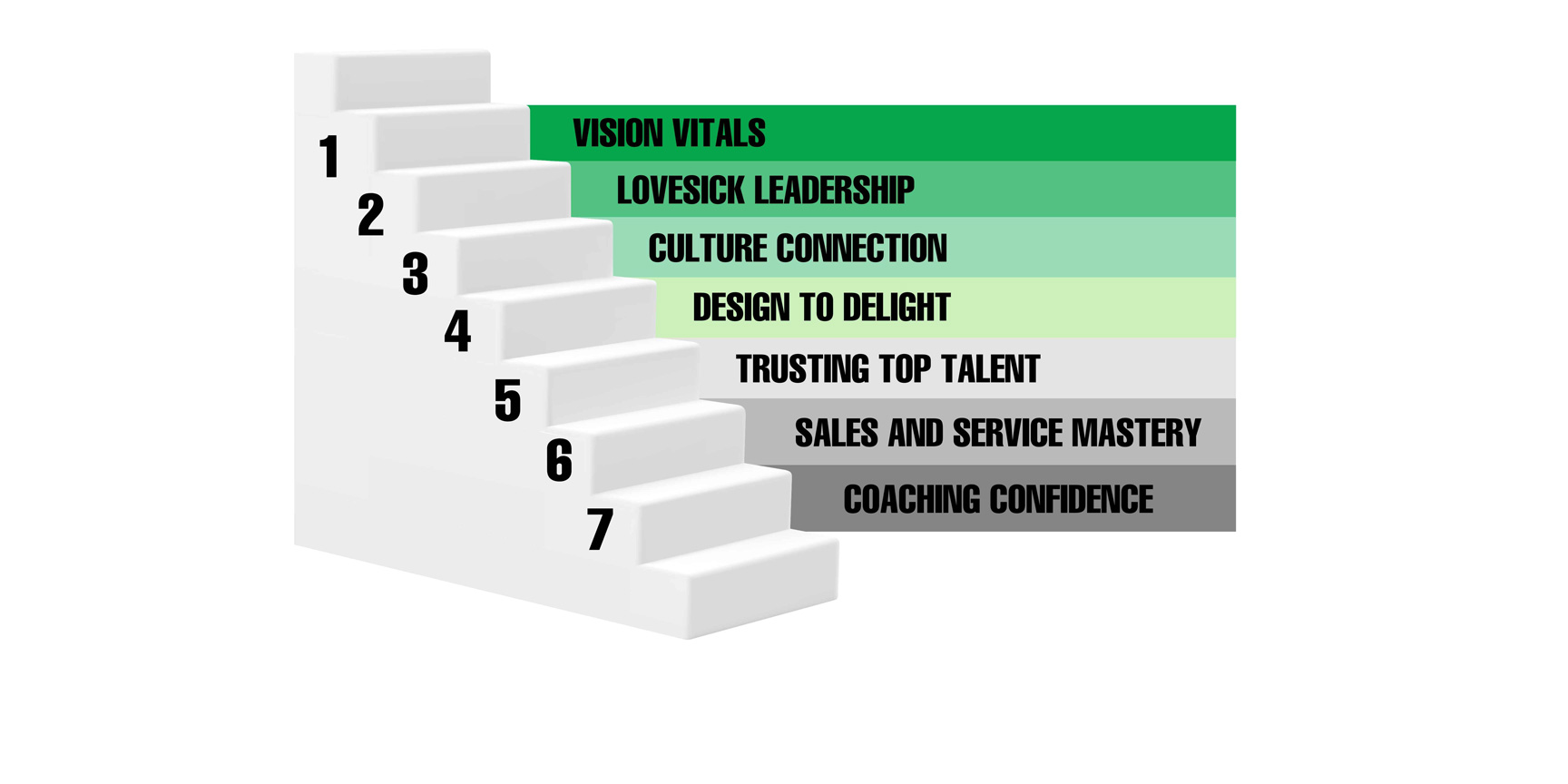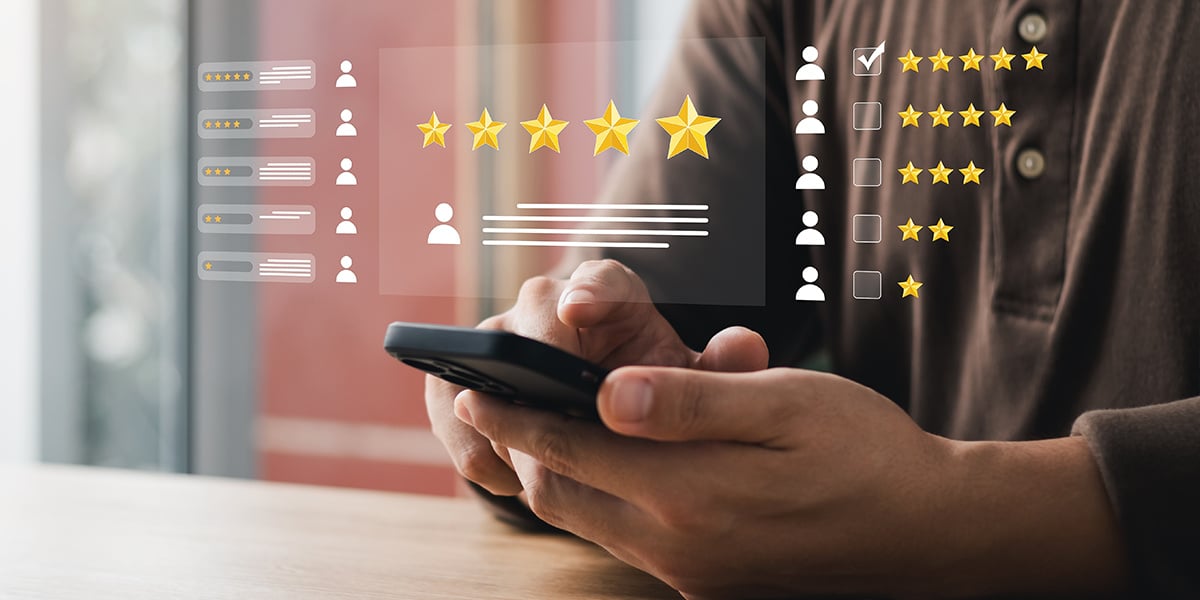Episode 62
Crystal D'Cunha, award-winning customer experience leadership coach, Chief Experience Officer at The Inside View, Inc., mother, and role model, shares her 7-step leadership training program, which recently won the gold award at the 2021 International Stevie Awards. She also gives inspirational advice to aspiring entrepreneurs.
Episode 62
Episode Summary
The 7 Step Program.
At the INSIDE View Inc., Crystal manages the training program 'to achieve Customer Experience Mastery'. It consists of 7 Steps that her clients explore throughout the course of 8 weeks, to drive sustainable, innovative, and experiential change in their organizations.
The 7 Steps are as follows:
- Vision Vitals - Get clear on how your team practices your Vision, Mission, and Culture every day.
- Lovesick Relationship - Each member of your team works on understanding their role in organizational adoption and accountability of CX design.
- Culture Connection -Understanding what it takes to be successful and to sustain it. This includes learning to journey map your customers' experience based on who you are working with.
- Design to Delight - Understanding the Voice of Employee and Voice of Customer to gain valuable, priceless customer insights and an understanding of their emotional needs.
- Trusting Top Talent - Attracting the right talent and designing every aspect of the employee experience to retain it. Setting up your employees for success.
- Sales and Service Mastery -Training employees on sales tactics, skills, and tools for customer service basics, as well as sales metrics and measurements.
- Coaching Confidence - Getting leaders into the habit of consistently coaching confidence and positive behaviors.
The Dance Metaphor.
Crystal also touches on the topic of diversity, equity, and inclusion, explaining it through the use of a metaphor:
She emphasizes the difference between having diversity just as a checkmark and having allyship, which means having a strong support system for those minority groups, to make sure they are actually being asked to dance.If you think of diversity as being invited to a dance, then inclusion is really about being asked to dance.
Invitation to Fail.
When talking about her entrepreneurial journey, Crystal says her advice to young entrepreneurs is to fail forward, fail fast, and fail famously. This is because failure is inevitable, but it is the most valuable learning experience someone can have, and it is best to fail sooner than later, to be able to improve the most.
This article summarises podcast episode 62"How to Achieve Customer Experience Excellence" recorded by CX Insider. For more information, listen to the episode, contact Crystal on her LinkedIn profile, and visit her website.
Written by Alessia Trabucco
Full episode transcript
Crystal: And then from a service perspective, we often find that service professionals are not trained on customer service basics, we believe we know it because we believe, you know, it's we have to be nice to people, we have to be kind to people, we have to help people. But there's this is a profession. And so we teach them the skills and all the tools how to manage and handle difficult customer situations. You know, instead of saying, if somebody says thank you instead of saying no worries, which is a negative and a negative, we say things like 'My pleasure', 'Absolutely, 'You're welcome', which you know this customer service basics but often people aren't trained on this. And so we want to be able to make sure that there are two boxes full of how to handle these difficult, challenging customer situations so that we can make sure every customer leaves with a great feeling.
Valentina: Hello, everyone, and welcome to another CX Insider podcast episode. Today's guest is Crystal D'Cunha, a consultant, motivational speaker, leadership coach, and inspirational figure based in Canada. We talk about Crystal's passion for customer experience, diversity, and inclusion, and Crystal also gives advice to aspiring female leaders. Enjoy the episode, and for those who don't know about our new Instagram account yet, feel free to check it out and give us to follow on Insider Podcast.
Valentina: Crystal is a truly inspiring entrepreneur with more than 20 years of experience in CX throughout her life. She has received a number of trainings and certifications from the Disney Institute, The Ritz-Carlton Company, Oprah Winfrey, and Tony Robbins. On top of that, she is also a certified John Maxwell leadership coach and keynote speaker. But when asking Crystal about where her passion for CX came from, she went back to her childhood in Niagara Falls, Canada.
Crystal: From a very early age. You know, my grandfather actually had the first Indian restaurant here in Niagara Falls, and when he ran the restaurant, I was, I think I was probably 10, 11 years old and we were pouring water for our guests. But right from the very beginning, it was, you know, these are our guests. We have to take care of them. And, you know, if something's wrong, we fix it. Like it was very much a family business, and it was about making sure that everybody that walked through those doors felt like they were at home felt like they were family. And he was very passionate about making sure that people came back. So every time they came back to Niagara, they would absolutely non-negotiable come and visit us, or they made sure that we were one of the stories that people shared when they went back home from their vacation. And so he was just he was really focused on making sure that we all did that as a family. We created stories with our guests that would come in to dine and we would create some magic moments. From there, I moved into the retail sector and again, the same thing, I realized I wasn't just selling a product. I was improving somebody's life by really creating confidence. And so I used to work for a company called Danier Leather. And I tell you, Valentina, when somebody puts on a leather jacket, something transformative happens, right? They have this, this confidence, and this boast about them. Have you? Would you agree? Have you had that experience?
Valentina: Absolutely, totally.
Crystal: Yeah, you stand a little taller. You kind of feel a little stronger, right? Because it's a tactile experience. So there's a smell to the leather, there's a feel, there's a touch. And so, what I was doing was not just selling leather jackets, but really improving somebody's confidence and somebody's life with the product that I was selling. And so transition into quite a number of years with them over a decade then got into the construction industry and the same thing we were selling. I was a vice president, of sales for a homebuilder and we were selling homes. But these homes were improving lives, right? It wasn't just everybody builds a fantastic home. There's not a builder. I know that doesn't try to build a phenomenal home, but our difference was that we were really focused on creating an experience and improving somebody's life. And so I got to a point where I had all this experience strategy that I was doing with other businesses, and I thought, You know what? I've had the Disney training, I've had the Tony Robbins training, I've done all the training I can. I really know that customer experience is the X-Factor. And so six years later, here I am with the inside view and we're making a dent in things. So yeah, that's me.
Valentina: Crystal is a chief experience officer at a company called the Inside View, for which she designed a seven-step training program, teaching companies how to deliver excellent customer experience. This program recently won the Gold Stevie Award for the best leadership program in the world, so naturally, I had to ask her to give you a bit of an insight into what this program provides.
Crystal: It's a seven-step program. Again, it's designed specifically for leadership teams to take together. So we've got a cohort coming up in the new year, and the idea is for leadership teams to really understand the foundation of not just leadership, but how you're going to lead with the customer-centric mindset and an employee engagement mindset and the right mindset to be able to move into the into 2022 and beyond. And so, step one is called vision vitals and envisioned vitals. We get clear on what the vision is, but we also talk about we don't create the vision for most organizations have their vision, mission, culture, core values, that type of thing. But we get clear on how does your team practice that every day? What are the tangible things they need to do on a daily basis to actually practice it all? Too often we find that they're just writings on a website or writings on a wall, and the staff is confused. They understand the terminology, but they don't understand what the tactical things are they need to do to practice and to get to that vision and to get to that mission, those little things they do on a daily basis. And so that's what we create in week one, which is Vision Vitals Week two, we dive into lovesick leadership.
Crystal: This concept of lovesick leadership is something that I really coined from Simon Sinek, actually. And so understanding, you know, I'm a mom, my whole goal as a mom is to be able to push our children further than we've ever could have achieved. And I believe that that's, you know, that's what we employers should be doing. I had a lot of success with that when I was with Danier Leather, you know, my goal was to make sure that I was bringing on great talent and pushing them further than myself, making sure that they were able to achieve bigger and better goals. And that's a lovesick nature, right? That I'm absolutely lovesick about you. So we teach about lovesick leadership. We bring in a lot of John Maxwell principals and Tony Robbin's principals into that one. Then we talk about cultural connection and so what it takes to cultivate a culture of success. And that's the point where we really bring diversity, equity, and inclusion into the mix. And so we talk about elements of designing a phenomenal culture and really what are our measurement tools for a phenomenal culture? So we use some really great measurements. Tools for employee engagement and we dive into the culture, then we talk about designing to delight. Valentine, I'm sure you're familiar with customer journey mapping.
Valentina: Absolutely. Of course, that's customer experience 101.
Crystal: Exactly right. And so and so we get back to basics designing to delight. So what we do is we'll take people through how to journey map with your employee experience as well as your customer experience. We work with a lot of not for profits, so it could be your donor experience, it could be your outside community experience, patient experience, depending on who we're working with. We start to map out from designing the persona to taking them through the journey and what's been really cool. Valentina's we've been able to do this digitally now since COVID and since we're all online, it's been a really fun and interactive process digitally. All right, so once we're done designing to delight, then we get into top talent and top talent is, Hey, how do we attract the right talent? And then what is the process of the interviewing process, the hiring process, the onboarding process, the training process, and then the retention process. So we really get clear on making sure that a small, medium business who typically doesn't focus on this typically a small business, you know, has a need. They hire somebody, they throw them on the floor and they say, OK, we'll train as we go, right? Have you ever worked in a restaurant or a retail Valentina? Have you ever had that experience?
Valentina: In a coffee shop
Crystal: Yeah. So it's we learn as we go right? And so and so we want to be able to make sure that there's a process that allows your employees to feel highly successful and, you know, really setting them up for success. So we use some unconventional methods in this process as well. We use video interviewing. I have a really fun process that allows people to send a three-minute video instead of a resume, and it really starts to eliminate the wrong people and really attract the right ones. So top talent is a phenomenal piece, especially now given the challenges with the great resignation. It's a great way to retain top talent. Um, and then we dive into sales and service mastery, so of course, we need a sales process, and we dive through what is the sales process, but also what is the service process? Again, small-medium businesses really designing that business model for what business looks like today. And then from a service perspective, we often find that service professionals are never trained in customer service basics. We believe we know it because we believe, you know, it's we have to be nice to people. We have to be kind to people. We have to help people. But there's this is a profession. And so we teach them the skills and all the tools how to manage and handle difficult customer situations. You know, instead of saying, if somebody says 'thank you' instead of saying 'no worries', which is a negative and a negative, we say things like 'my pleasure', 'absolutely', 'you're welcome', which you know these customer service basics. But often people aren't trained on this. And so we want to be able to make sure that are two boxes are full with how to handle these difficult, challenging customer situations so that we can make sure every customer leaves with it with a great feeling.
Crystal: The last one is coaching confidence as we give leaders the tools they need to coach confidence within their team. You know, right now, Valentina, you've probably heard like this is the time of year when everybody does those annual reviews. And so what we want to be able to do is remove the annual review process because, you know, it just doesn't feel good that six months to a year later after you've had success or perhaps you've made a mistake, you're hearing about it a year later, right? And so what we want to be able to do is get leaders into the habit of consistently coaching success because as a leader, if you're putting in a 40 hour work week, you know, a good 70-80% of your time should 100% be invested in coaching confidence amongst your team. And so, yeah, so those are seven steps. And when you're able in the course itself, it's over eight weeks. There are four-hour blocks over the course of eight weeks. And the nice thing is that when they're done their leadership training, they actually leave with a solid, solid blueprint on how to implement it, and they're implementing it every week as they go through. But then also we follow up, so we do a quarterly check-in with the entire cohort. And so you're accountable, not just to yourself, but also to the members in your cohort to measure success.
Valentina: One step of a program is about cultivating a diverse and inclusive culture. I asked Crystal to elaborate on how exactly that may translate into customer experience as believe it or not. While this topic is being frequently discussed in one part of the world, it is still non-existent in many places.
Crystal: Well, I think, you know, we've been teaching diversity, equity, and inclusion for the last six years since I started the company. It was one of the first programs we launched. However, as you know, it's a timely, timely topic, and so it's just recently taken a bit of interest. Within the last two years, it certainly has skyrocketed interest. And so when I was creating, we offer it in two ways, Valentina. So the first way is a complete certification in diversity, equity, and inclusion, and the second way is a part of our leadership training. And that's where they just get a little taste of the impact that diversity, equity, and inclusion can make on customer experience. And so when you're asking, you know, why is it important in this space? Well, it's really because our world and the clients that we serve are such, you know, it's a global audience. We're serving clients from across the globe from every, you know, different socioeconomic classes, abilities, disabilities, and gender. I mean, there are just so many different types of people that we have to remove these biases and sometimes unconscious biases that people have when it comes to their marketing, their sales, and who they believe their ideal customer is.
Crystal: It starts to really open up market segments for organizations, but from an internal perspective, when you focus on creating a culture that really cultivates success with that diversity, equity, and inclusion lens, you'll start to really see the camaraderie open up. You'll start to see people feel more appreciated and accepted. You'll start for people to, you know, just enjoy coming to work right? And so when that culture is good, when you've got happy employees, Valentina, you've got happy customers, right? And so that's the goal. We want to be able to make sure that everybody, regardless of what demographic they're coming from, they're all feeling accepted and valued and respected in their internal work environment, but also as customers. I know nowadays if I'm doing business with somebody and I start looking at their Instagram. And there's not one post of somebody of colour, I think twice about doing business with them, I really do. You know, I'm a woman of colour. I'm raising a young black man who's 18, and it's important for me to make sure that I'm doing business with organizations that that that value me, right?
Valentina: So, speaking of inclusion, Crystal used a very nice metaphor and compared it to being invited to a dance.
Crystal: I always say if you can think of diversity as being invited to the dance, then inclusion is really about being asked to dance, right? So I've often been invited to the dance. I've been invited to boardroom tables, I've been invited to organizations, I've been invited to boards. But then I find often I don't actually get invited to dance. So it's one thing to be there as a checkmark, but it's another thing to actually have allies that will support us in making sure that we're asked to dance so that that allyship is quite powerful.
Valentina: Crystal is certainly no fear of anything unknown, which is a highly desirable trait in business. And when I asked her if she could give advice to aspiring entrepreneurial women, she said,
Crystal: Fast forward, fail fast and fail famously because I think, you know, as an entrepreneur, it's not always rosy. It's not always the perfect storm. You're not sitting on a laptop, working on your beach. You know, it's you have to be willing and able to fail and fail. It comes in all sorts of forms. But when it does happen, at least you know you've tried no one. And then the other part is you want to fail forward. So what's next? Hey, this didn't work. What did I learn from this and then fail? Famously, I love to share that I'm a part of a few different organizations and groups and associations, and you know, we talk about failure all the time, like, let it out. Share it. Share what you learned. And so that others don't make the same mistakes as well so that others can learn from the challenges that you've gone through. And so, yeah, I would be, you know, just embrace. I don't even like the word failure. I've been trying to come up with a different word because I think it has such a negative connotation, but it's such a positive thing when you try something right? And so, yeah, that would be my biggest advice.
Valentina: Crystal, I still have five rapid-fire questions that I include by the end of the episode and those, if you're OK, I could ask you.
Crystal: Yes, absolutely. I'm ready.
Valentina: So the first question is what does success mean to you?
Crystal: So right now, you know, I'm at a really great point in my life, my son just received a university offer yesterday that was a success to me when I'm able to share, to see, to see my son do phenomenal that success and I'm able to do that because I'm an entrepreneur. I have the time to give him. I have the time to invest in flexibility. There are just so many benefits from being an entrepreneur, but success is really seeing him do phenomenal things. He's my everything.
Valentina: So the next question I have is, what's the one thing you wish you had known when you began your career?
Crystal: Hmm. Be frugal to really pay attention to your numbers. I think that was really important in the beginning. You know, people didn't necessarily have faith in what you were in my entrepreneurial journey, right? And so there was a challenge for me in terms of knowing my numbers. And somebody once said, Crystal, if you're not paying attention to your numbers, it's just a hobby. It's not a business. And so getting clarity on my numbers and where I was spending what I was spending, how I was spending it, that was definitely something that if I could go back, I would have. I would have gotten better at it quicker.
Valentina: Do you have a morning ritual, you know, as they say, successful people, they all have a morning ritual? They wake up at four a.m., they do the morning run, then they meditate for half an hour.
Crystal: Well, I definitely have a morning ritual. I'm not a 4 am girl, I'll tell you that. But typically, typically I'm up between 5.30 and 6, and I definitely have a morning ritual. So I'm a big walker, I love to walk and you know, it gets a little cold out here in the wintertime, but we still manage. So I really, really enjoy walking. And of course, I'm a big gratitude person, so it's really about my daily affirmations and gratitude and then really getting clarity on what I want to achieve for the day personally as well as professionally. And so that's a big part of it, too, is that I'm not just focused on work. There are a lot of personal things that we need to get done during the day too. And so those are a top priority as well. So yeah, so I would say my morning walk is probably the best part of my morning routine. And then, of course, I eat breakfast every morning and you know, the water with lemon, that's kind of my routine. But walking is a big part of my day and I listen to podcasts and all sorts of audiobooks as I walk because it's the only time I have to read. As much as I love books, almost every one of the books you see behind me is all on audiobook as well, and so I'll listen to them on audiobook. And if I like it, I'll buy it and then I make my notes in the actual book. So a little unproductive, but it's the best way I can get through a book.
Valentina: My last question is, what's the best advice you have ever been given?
Crystal: People love to buy but hate to be sold. People love to buy but hate to be sold. It has stuck with me since I was 16 years old. You know, I'm in customer experience, but you know, selling is something that I love to do. I enjoy doing it. Most people think it's a scary, scary thing to do sales or it's a sleazy thing. A lot of people think that they've got this impression. I love sales because I really feel like when I'm selling something to somebody, I'm improving their life. I do it authentically. I do it genuinely. And if it's not appropriate for them, I don't sell it to them. So I really feel good about the sales process. And so when I read this section quote from Jeffrey Gordimer and I had an opportunity to meet him years ago, and he said, You know, people love to buy, but they hate to be sold, which makes so much sense to me. And so, you know, instead of selling, you're creating an experience for them, you're creating a relationship with them and you're really improving people's lives. So that would be, yeah, that would be my biggest, my best advice ever given.
Valentina: If you enjoy this episode, please don't forget to give us a like-share comment or subscribe to the podcast on your preferred channel. If you enjoy the conversation with Crystal feel free to check out her website in the podcast episode description below, and I will see you next time.






